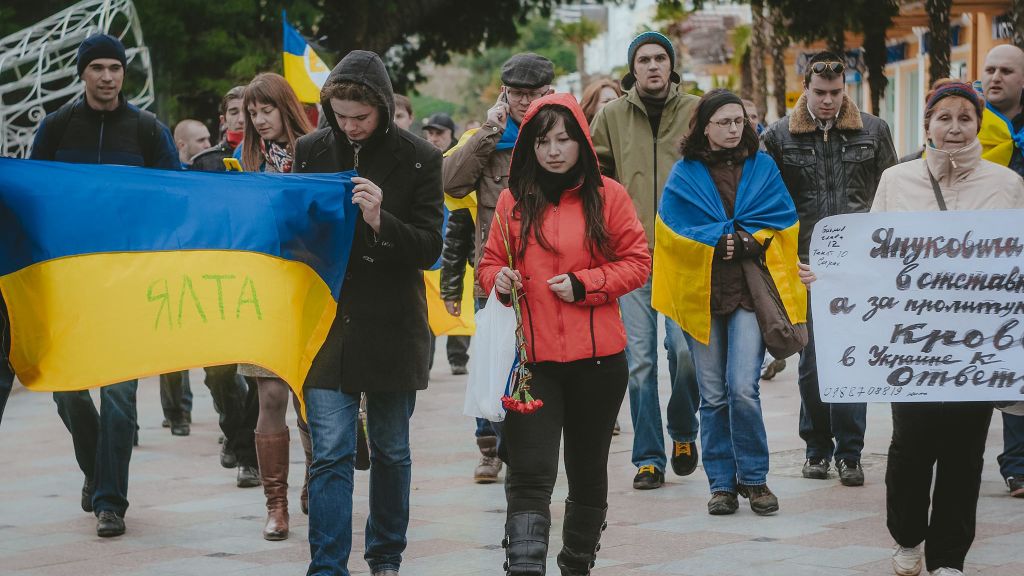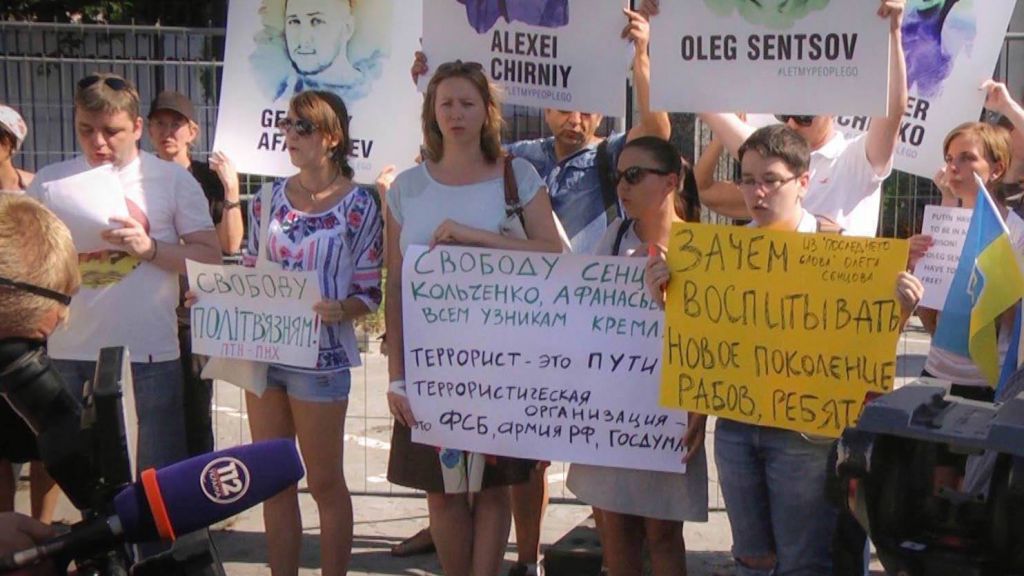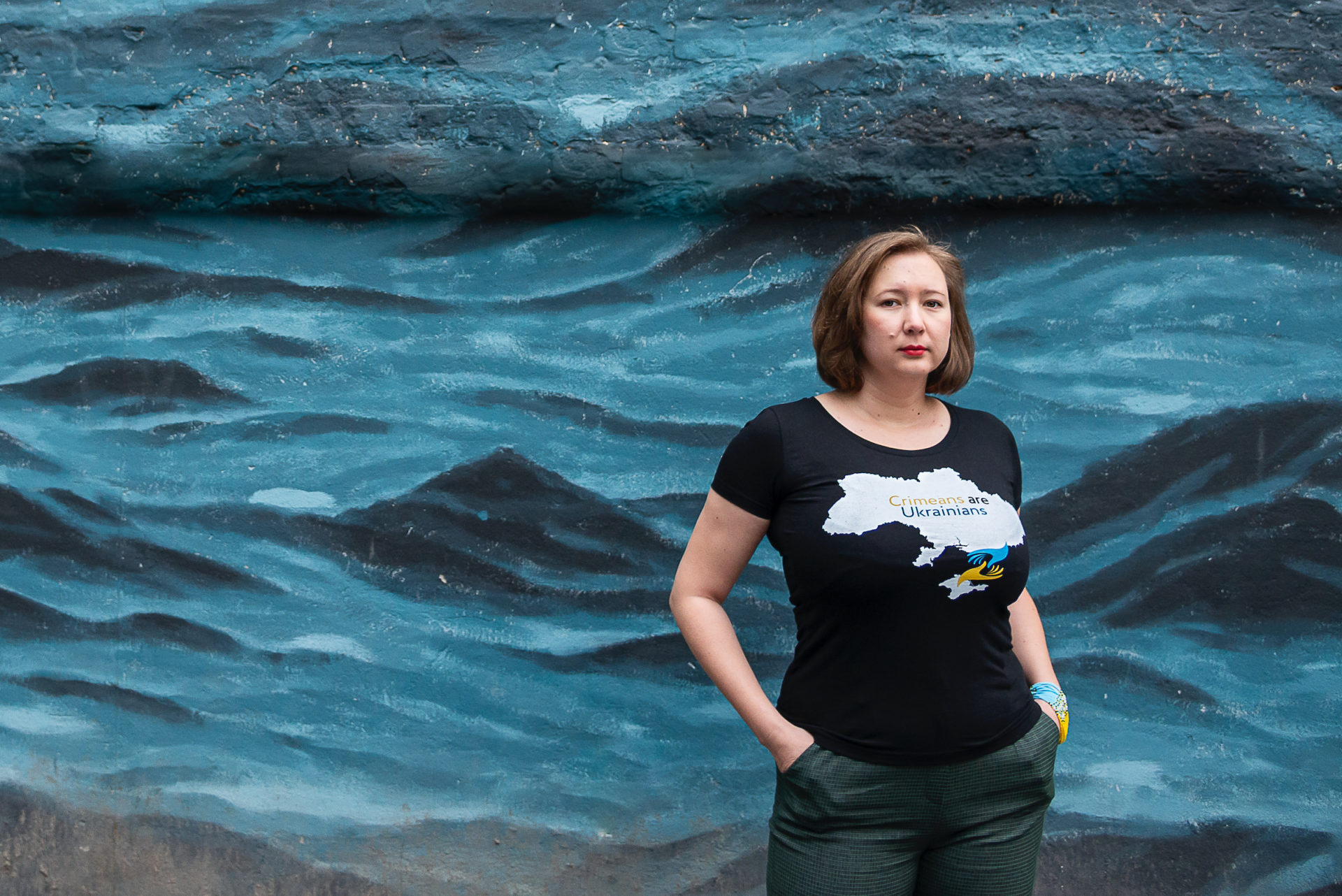Olga Skrypnyk is now the Head of the Crimean Human Rights Group (CHRG), an organisation that supports civil society and promotes the observance and protection of human rights in Crimea. CHRG also supports Ukrainian political prisoners who are imprisoned in Russia and Crimea.
Before being forced to flee Crimea in 2014, Olga Skrypnyk participated in the founding of two human rights groups and worked as a University senior lecturer. She explained her early interest in human rights:
“My mother worked in the healthcare system, and because of her I was aware from a young age of the pain of different people, and this motivated me to want to help people. Since I was a teenager I have had an interest in human rights, and was involved in different kinds of activism including school self-government, a role as the head of the class, involvement in assistance to low-income seniors, and eco-activism. I became more focused on human rights and legal disciplines when I went to study at university. During my studies, I gave free legal consultations to my fellow students, and I continued to do this when I became a lecturer at the Crimean University for the Humanities in Yalta. All of my working life has been linked to Crimea.”
She followed through on her motivation to help people, establishing the non-governmental organisation Almenda to provide civil education, give legal aid, and promote discussion on human rights:
“In 2008, I, together with some students and teachers, co-founded the Human Rights Initiative Group in Yalta. After that, my colleagues and I established the non-governmental organisation “Centre of Civic Education ‘Almenda’” in 2011. I served as the head of the Almenda before the annexation of Crimea. Prior to the annexation, Almenda’s priorities were to provide civil education for high school students, and to give free legal aid.
To promote discussion on human rights, we established a bi-monthly cinema club in Crimea, attended by schoolchildren, students, teachers, and local residents, and special guests – human rights activists, directors, journalists, and lawyers. Club members took part in the movement “EuroMaidan-Crimea” in support of human rights, and democratic values in Ukraine. When the occupation of Crimea began, we held anti-war rallies. Following the annexation, the cinema club continues its work in Kyiv.”
 Cinema club members at an anti-war rally.
Cinema club members at an anti-war rally.
“Almenda acted as the Crimean coordinator for the annual Docudays film festival, and cooperated with local independent media in their coverage of human rights issues. Almenda held six festivals in the south of Crimea prior to annexation, after which, the festival was banned by the Russian authorities and it became impossible to continue with it.”
The annexation of Crimea created new human rights challenges, and this led to the founding of the Crimean Human Rights Group:
“Following the annexation, I took part in the establishment of the Crimean field mission on Human Rights. After the closing of the mission, my Crimean colleagues and I established the Crimean Human Rights Group.
The annexation changed the circumstances in Crimea, and the need to monitor the situation of human rights in the region. It was important to collect evidence of crimes and violations committed during the conflict, and to further disseminate this evidence to organisations such as the International Court of Justice, OSCE, the European Court of Human Rights, PACE and the UN.
For example, on 8 March 2017, there was a session of the UN International court of justice where information provided by the CHRG was used as evidence. The evidence provided highlighted violations of the international convention on the Elimination of All Forms of Racial Discrimination committed by Russian authorities in Crimea.
 Action at the Russian Embassy in Kyiv demanding the release of Ukrainian political prisoners.
Action at the Russian Embassy in Kyiv demanding the release of Ukrainian political prisoners.
My motivation was the same after the annexation, but I felt a new focus, and new issues appeared such as the defence of persons who have struggled under human rights violations after the annexation. One of the most important new directions is to help political prisoners who have been detained for their activities focused on Crimea.”
The CHRG is one of the few organisations reporting directly from Crimea on human rights violations:
“The most important thing in our work is that we collect information directly in Crimea, check it “in field”, and then communicate with victims and relatives. Almost all members of the Crimean Human Rights Group are Crimeans, and those who live in Crimea work with us. But they are forced to work non-publicly and underground. All of them and their relatives are at risk for this reason.
We produce news on the situation in Crimea which is for Ukrainian society in general. There are few organisations that present information about human rights violations in Crimea.
The second focus of the news is Crimeans themselves – we want to inform Crimeans about violations and how to protect themselves. We prepare recommendations for Crimeans on how to live without having their human rights violated by the authorities.
When it comes to analytics products such as monitoring and reports, we make these for international organisations. In order to reach our audience, my colleagues and I are in constant communication with the media, which Crimeans and residents of Ukraine watch and listen.”
Olga Skrypnyk received serious threats and was forced to flee Crimea. She has had to start her life again from scratch:
“I fled Crimea on 16 April 2014. The main reason is that I received direct threats from the Russian special service that they would detain or kill me. One of my colleagues was actually captured and imprisoned by the Crimean self-defence forces during this time, although he has since been released. I have been detained twice by Russian law enforcement agents.
It is hard for me because I now have no possibility to be with my family as it is extremely dangerous for me to visit Crimea. It is also very hard to live here in Kyiv because I have had to start my entire life again from scratch because I did not have a job, no housing. My wedding, a huge moment in my life, was in Kyiv and not in Crimea, and the only relatives that were able to attend were my mother and brother. The road from Crimea is long, and now it is necessary to go through two de facto borders in Crimea.
When I arrived, my colleagues in Ukraine helped me and my husband to find an apartment. There was, and still is, no help from the government, no assistance in finding where to live, or in finding a job.
The Crimean Human Rights Group tries to help others in this situation. We help not only people in Crimea under persecution from the Russian authorities, but we also try to help Internally displaced persons (IDPs) and citizens of Ukraine.
Professionally, I was a university lecturer, and human rights was a civil activity, but now human rights activism is the main direction of my life.”
Olga Skrypnyk has herself experienced how questions over citizenship and residency have violated the economic and social rights of Crimeans.
“My citizenship is Ukrainian. The Russian authorities have recognised me as a citizen of Russia against my will, but this is not true because there are no legal documents supporting this. All the inhabitants of Crimea, Ukrainian citizens, were automatically, and without their consent, recognised citizens of Russia by the Russian authorities.
Ukraine has adopted an additional law which recognises Crimeans as citizens of Ukraine, but not as residents. This creates violations for our economic and social rights – we are unable to use banks, we are unable to take pensions and payments for children, basically any case of state support for citizens.”
Olga Skrypnyk explained that maintaining a connection between people in Crimea and mainland Ukraine is a huge priority of CHRG, and that it is the only initiative to constantly document violations:
“For us, the most important thing is that we continue to keep a connection between people in Crimea and mainland Ukraine. We try to help them around the clock, we keep in touch with people day and night. We provide support in different forms to 10 Crimean political prisoners.
We are the only initiative in Crimea that constantly, every day, documents a wide list of violations of human rights, not only the cases of political prisoners, but also freedom of assembly, freedom of speech, and discrimination. Regardless of the circumstances, every month we publish reviews and evidence of violations. Over three years we have published 35 such reviews.”
 The evidence presented by CHRG on 8 March 2017 to the UN International Court of Justice highlighting violations of the international convention on the Elimination of All Forms of Racial Discrimination commited by Russian authorities in Crimea.
The evidence presented by CHRG on 8 March 2017 to the UN International Court of Justice highlighting violations of the international convention on the Elimination of All Forms of Racial Discrimination commited by Russian authorities in Crimea.
“Our evidence is now used in international courts. The results of our continued monitoring were taken into account during the issuing of important international documents – the UN General Assembly resolution, PACE resolutions, EU decisions.
There are other results, but I cannot talk about them yet, in order to ensure the safety of those involved.”
While some have responded to the annexation by adopting a hostile anti-Russian sentiment, Olga Skrypnyk remains focused on Human Rights:
“Many pro-Russian people were victims of Russian propaganda; they were deceived. Human rights are universal; therefore it is necessary to protect human rights for all Crimeans. Even those who have committed crimes, they should also be judged in compliance with human rights.
The importance for me is helping with human rights, staying focused on helping people. Human rights is the way to a peaceful life.”
Looking to the future, Olga Skrypnyk sees human rights as the primary focus of her life, and expands on her hopes for Crimea and Ukraine:
“I will continue to work on the protection of human rights. I hope that I can return to the Crimea and continue my human rights activities there. Now we are documenting evidence of new crimes of the Russian authorities in Crimea. I will also work to ensure that the standards of the Ukrainian parliament are the standards of human rights. I hope that we will be able to ensure that there is no blockade of the occupied territories of Ukraine. We are participating in the initiative to establish Human Rights House Crimea in exile. But so far we are just at the stage of discussing this with partners.”

Action in support of the Crimean political prisoner Alexander Kolchenko
—
Monthly newsletter of the Human Rights Houses and HRHF
This article was first published as part of the monthly newsletter of the Human Rights Houses and HRHF. Sign up to receive news and insight into human rights issues and country situations, the projects and activities of Human Rights Houses, and portraits and interviews with human rights defenders.
About Olga Skrypnyk
Olga Skrypnyk is a Crimean human rights defender Head of the Crimean Human Rights Group (CHRG), who lives in mainland Ukraine following her fleeing Crimea in 2014 after the Russian annexation of the peninsula. She was born in Siberia, Russia, but moved to Crimea with her family when she was a young child. As an adult, she co-founded Alemenda and is now the head of the Crimean Human Rights Group.
Detentions
She has been detained twice by the Russian authorities. The first time on 12 September 2014 while she was travelling from Russia to Ukraine with her now-husband, Vissarion Asseev – both of them working for the Crimean Field Mission. They were detained by Russian border guards and were informed that their right to leave Russia had been limited, although they were released following an interrogation.
She was detained for the second time on 13 March 2017 while participating in monitoring a checkpoint along the administrative border between Crimea and mainland Ukraine. She was detained with some other activists in a buffer zone between the Ukrainian and Russian checkpoints.
Law on internally displaced persons (IDPs)
Olga Skrypnyk is a co-author of a law in Ukraine changing the status of IDPs from Crimea and Eastern Ukraine. The draft of the law received the support of many international organisations, for example, the bill received a positive assessment from UNHCR. The law was adopted and continues to work in Ukraine – it is the main law in Ukraine that protects IDPs.
About the Crimean Human Rights Group
The Crimean Human Rights Group is an organisation focused on supporting civil society in Crimea and promoting the observance and protection of human rights in Crimea by attracting wide attention to problems of human rights and international humanitarian law on the peninsula, as well as support for Ukrainian political prisoners who are imprisoned in Russia and Crimea.
Political prisoners supported by Crimean Human Rights Group
CHRG work to help several political prisoners, including: Vladimir Baluch who was arrested as he raised the Ukrainian flag on the roof of his home in Crimea and now faces up to four years imprisonment; Ruslan Zeytullaev, Crimean Tatar and activist; several Ukrainian citizens labelled by the Russian Federal Security Service as “members of the terrorist group the Ministry of Defence of Ukraine”; Crimean political prisoner Alexander Kostenko; Crimean Tatar and lawyer Emil Kurbedinov; and imprisoned Crimean filmmaker Oleg Sentsov.
HRHF’s work on Crimea
- Crimea: The rule of Kremlin prevails over the rule of law
- Deteriorating human rights in “Russianised” Crimea needs international scrutiny
- Crimea: Distressing Human Rights Situation Needs International Attention
- UN resolution on Crimea: Crimeans deserve better
- PACE: Don’t compromise on Russian human rights
Interviews with Defenders from the Human Rights Houses
Mamikon Hovsepyan
“When I was a teenager I left Armenia because, as a gay person, I felt unsafe. I moved to the United States and found it to be a huge change. After living there for about 4 months I felt that if I wanted freedom and peace, then I would have to earn it – and that I wanted to work for change in my country.”
Read more in The Reality of LGBT+ activism in Armenia.
Lara Aharonian
“In society, if we can resolve gender identity and orientation, other things would be very easy to resolve. Feminism is intersectional, you can’t raise the issue of patriarchy and only talk about women. Patriarchy attacks all kinds of people that aren’t the so-called social “norm”.
Read more in Fighting for Women’s Rights and Equality in Armenia.
Shahla Ismayil
“Many people think that if you have a women’s agenda, that it is sort of soft issue and that you don’t confront much. But it is not true – women’s rights cannot be at good level in a country where the general human rights record is poor. So, most of the issues which we combat are related to discrimination, which is not only related to traditions and stereotypes, but also to the lack of rule of law, corruption, and bad governance.”
Read more in Two Decades Empowering Women in Azerbaijan.





